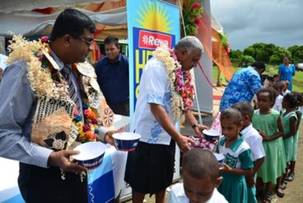 Bainimarama and Mahendra Reddy distribute free milk and Weetbix at Nakelo District School in Tailevu
Bainimarama and Mahendra Reddy distribute free milk and Weetbix at Nakelo District School in Tailevu Speaking to FBC News, Fiji Teachers Union General Secretary Agni Deo Singh says they’re still concerned with the distribution and storage of milk in schools.
“The rural and maritime schools where there might not be facilities for storage in terms of temperatures it requires to be kept at, our country is a very warm country. We’ll have to be careful about preserving it.”
Fijian Teachers Association President Gauna Halofaki says their main concern is the preservation of milk and its supply to schools in outer districts.
“It’s a geographical set up of Fiji we have so many rural schools and Fiji is scattered so much it’s the sending of the milk and the preservation and those are the things we need to think of.”
Fiji Muslim League President Hafizud Dean Khan says they have not received any response yet from their primary schools in regard to storing their milk supply.
In a statement, a faith- based organization, the Arya Pratinidhi Sabha of Fiji, says the program is a first in Fiji’s post independence history.
Sabha President Kamlesh Arya said they are conscious that many primary schools, have attached kindergartens where younger students need similar attention.
The initiative, laudable as it is, is somewhat discriminatory in a sense the youngest stand by watching and waiting but are not included in the program.
Meanwhile, the Education Ministry’s Director for Primary Education Kolinio Takali says they have visited all education districts last month to brief them on how to store and document the milk supply.
“In some schools in some areas where truck or carriers cannot reach the school we have drop off points then they’re grouped in clusters, then one is tasked to arrange for transport from the drop off points off that cluster to each schools.”
Prime Minister Voreqe Bainimarama had said the 250 ml packets have a shelf life of six months.
Free milk for the youngsters will benefit the growth and nutrition of students. Source: FBC News

